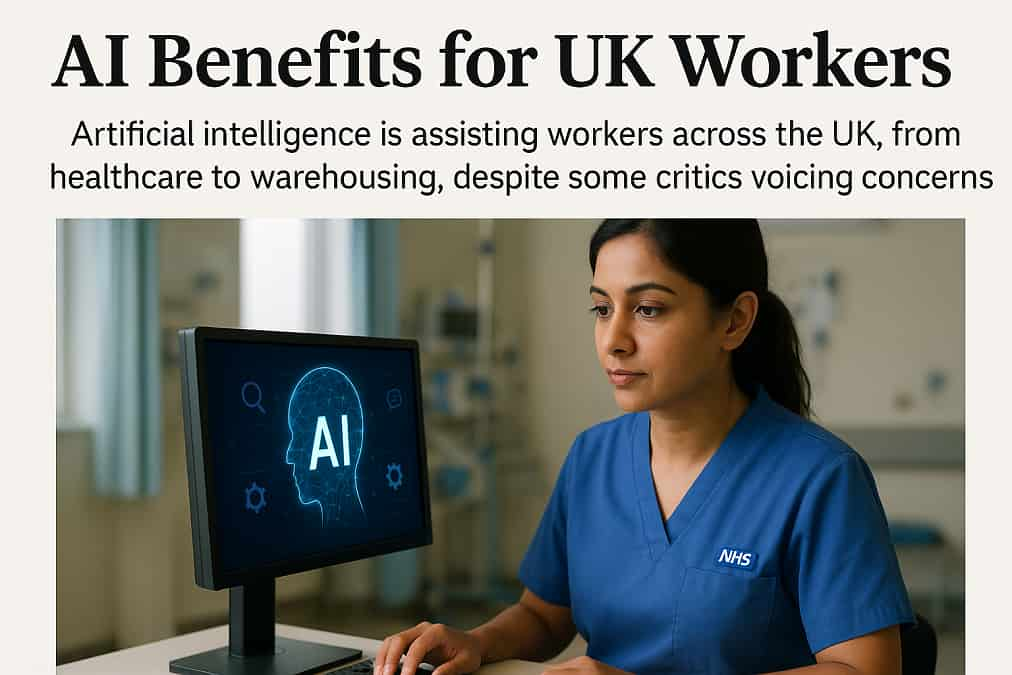Artificial Intelligence (AI) at work is no longer a distant concept reserved for technologists and academics. It has already entered the daily lives of working people across the UK, shaping the way industries operate and changing how staff deliver and receive services. From the wards of the NHS to the warehouse floors that supply the nation, AI is steadily becoming one of the most significant forces of modern working life.
Supporters of this transformation argue that AI represents an enormous opportunity. In healthcare, for example, algorithms are speeding up diagnostics, freeing up clinicians to focus on patient care, and helping overstretched teams manage increasing workloads. NHS trusts are already deploying AI tools to identify patterns in imaging scans, cutting the time it takes to deliver results and, ultimately, improving patient outcomes. Far from replacing skilled professionals, AI is working as a co-pilot, offering precision and efficiency in a sector under constant pressure.
In logistics, AI-powered systems are optimising routes, cutting fuel costs, and improving delivery reliability. Drivers are now supported by advanced scheduling platforms that predict demand, manage traffic challenges, and ensure that goods arrive on time. Warehousing staff, too, are benefiting from automated picking systems and AI-enabled safety monitoring, which reduce physical strain while keeping pace with consumer demand.
Education is also being reshaped. Teachers are harnessing AI-powered software to personalise learning for students, track progress more effectively, and manage administration more efficiently. By reducing the burden of routine paperwork, AI tools allow educators to focus on their primary role: teaching and inspiring the next generation.
In human resources and the legal profession, AI is enhancing efficiency. HR managers are increasingly using AI platforms to sift through applications, identify potential candidates, and streamline onboarding processes. Law firms are deploying AI-assisted research tools that can analyse vast volumes of case law in seconds, offering solicitors sharper insights and saving countless hours of manual review. These advances give professionals more time to apply their judgment, skill, and expertise where it matters most.
On the shop floor, AI is monitoring stock levels, predicting consumer trends, and ensuring that shelves remain filled. Retail workers benefit from more responsive systems that reduce stress during peak demand and allow them to concentrate on customer service. The knock-on effect is better consumer satisfaction and improved operational efficiency.
Despite these clear benefits, some advocates of caution continue to suggest that AI presents risks. Critics claim it could lead to over-dependence, erode certain skills, or even displace jobs. Yet, in many cases, these same voices are quick to publish their findings through AI-driven platforms such as Google, consumed on AI-powered devices, and amplified across AI-optimised social media feeds such as X.com. The irony is striking: the very critics who challenge AI rely on its reach to make their case heard.
The reality is unavoidable: AI is here to stay. It is supporting business, strengthening society, and transforming sectors that underpin everyday life. AI in work is a jobs evolution, not a extinction. It is true that some will remain sceptical and others may argue the technology is detrimental. But as experience across industries shows, AI is less a threat than an ally—one that is capable of delivering gains in productivity, efficiency, and wellbeing.
The Workers Union was among the very earliest of adopters of AI, recognising that to serve working people effectively, embracing innovation is essential. By adopting AI-driven solutions early, it has been able to support members faster, more accurately, and with greater resources than ever before. This foresight demonstrates that the question is no longer whether AI will shape the future of work—it already is. The task now is to guide its progress so that working people across the UK benefit from the opportunities it brings.
AI is not an abstract concept. It is already embedded in how Britain’s workers deliver care, move goods, teach children, manage cases, and serve customers. It is, in short, part of the fabric of modern working life.




